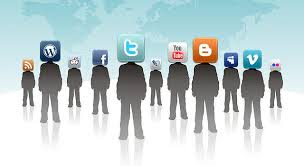how does social media affect on our health
In 2012, Medical News Today provided details regarding a study proposing that Facebook use might nourish tension and build a man's sentiment deficiency.
A later study, drove by social specialist Ethan Cross of the University of Michigan, found that utilizing Facebook might even make us hopeless.
"At first glance, Facebook gives a priceless asset to satisfying the essential human requirement for social association," says Kross. "But instead than improve prosperity, we found that Facebook use predicts the inverse result - it undermines it."
However, are such claims misrepresented? On the other hand would it be a good idea for us to be restricting our utilization of online networking? Restorative News Today takes a gander at the confirmation.
What is online networking?
Fundamentally, online networking characterizes a variety of Internet locales that empower individuals from everywhere throughout the world to communicate. This can be through discourse, photographs, video and sound.
Facebook is the main long range informal communication site, with more than 1.2 billion worldwide dynamic clients consistently. The site's prominence is taken after nearly by MySpace, Twitter, LinkedIn and Bebo.
Facebook screenshot
Overall, Americans burn through 7.6 hours utilizing long range informal communication locales, for example, Facebook, consistently.
The most recent measurements demonstrate that around 42% of online grown-ups utilize numerous person to person communication destinations. Maybe of course, the lion's share of online networking clients are less than 30 years old, in spite of the fact that the quantity of more seasoned clients is on the ascent. Around 45% of Internet clients matured 65 or more seasoned now utilize Facebook, expanding from 35% in 2012.
By and large, Americans burned through 7.6 hours a month utilizing online networking, with the lion's share of people getting to long range informal communication locales through phones.
Yet, what pulls in us to online networking?
In the late 1980s, the first business dial-up Internet administration supplier (ISP) was dispatched in the US. Web innovation has unquestionably progressed in the previous 25 years, to such an extent that the words "dial-up" make a great many people flinch.
Obviously, one of the principle attractions for joining with the Internet was, and still is, the capacity to better interface with our general surroundings. For instance, the Internet permitted us to send messages as a different option for the opportune procedure of sending letters through the mail. Online networking has based on this reason.
This is Facebook's statement of purpose:
"Facebook's main goal is to give individuals the ability to share and make the world more open and joined. Individuals use Facebook to stay associated with loved ones, to find what's happening on the planet, and to share and express what makes a difference to them."
This aggregates up what the lion's share of person to person communication destinations attempt to accomplish, and there is probably the overall population has succumbed to the universe of online networking, maybe excessively much.
Online networking enslavement
Late insights demonstrate that 63% of American Facebook clients sign on to the site day by day, while 40% of clients log on various times each day.
We all have our own purposes behind utilizing online networking. A few of us like to skim at other individuals' announcements and photographs, while others utilize the locales as an approach to vent their feelings. In any case, as per Dr. Shannon M. Rauch, of Benedictine University at Mesa, AZ, one of the principle reasons we utilize online networking is for self-diversion and weariness help.
"Along these lines, online networking is conveying a fortification each time a man sign on," she says.
"For the individuals who post announcements, the fortifications continue coming as strong remarks and "prefers." And obviously we realize that practices that are reliably strengthened will be rehashed, so it turns out to be hard for a man who has added to this propensity to just stop."
This conduct can prompt Facebook compulsion. Truth be told, such conduct is common to the point that analysts have made a mental scale to gauge Facebook fixation - the Berge Facebook Addiction Scale (BFAS).
The scale, created by Dr. Cecile Andraessen and partners at the University of Bergen in Norway, utilizes six criteria to quantify Facebook enslavement. These incorporate explanations, for example, "you invest a considerable measure of energy pondering Facebook and arranging how to utilize it" and "you utilize Facebook to disregard individual issues." The scientists say that scoring "regularly" or "frequently" on four of the six criteria shows Facebook compulsion.
What is fascinating is that the specialists found that individuals who are more restless and socially frail will probably utilize the long range interpersonal communication site.
A year ago, Medical News Today wrote about a study that gave a potential clarification to dependence on Facebook "distinction."
The exploration group, drove by Dar Meshi of the Freie Universität in Germany, found that people who increased constructive criticism about themselves on Facebook indicated more grounded action in the core accumbens of the mind - an area connected with "prize" handling. This more grounded movement corresponded with more noteworthy Facebook use.
From these studies, it creates the impression that numerous clients who are dependent on Facebook utilize the site as a method for picking up consideration and boosting their self-regard. In any case, can this conduct effectsly affect psychological well-being and prosperity


